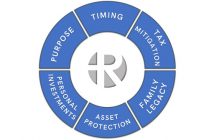
Keeping Tabs on Important Documents is Good for Your Finances
One thing about financial and estate planning, it can take a lot of paper. Important documents like wills, insurance policies, bank account information and legal documents need to be not only stored safely, but also readily available when you or your beneficiaries need them. An important, and often overlooked, part of financial planning is simply being able to access information and documentation when you need it. Fortunately, organizing your important documents is not difficult, and once your personal system is set up it takes only a few minutes every year to maintain.
Before you start organizing your documents, the first thing to do is get rid of the things you don’t need. For example, you likely don’t need any of your regular or monthly bills or statements that have no bearing on your taxes (like phone, cable or utility bills, ATM statements, store receipts, etc.). These can be discarded once you have recorded them in your checkbook, budget spreadsheet or other bookkeeping method.
Next, set up a simple system that contains documents like wills, insurance policies, deeds and titles. Include a complete list, with account numbers and phone numbers, of all the mutual funds, insurance policies, bankers, lawyers and doctors you and your family have. Also, make a list of your bank accounts, credit cards accounts and loans. Create an inventory of your household possessions of value.
Your online information – all the websites, social media accounts and email you access – should also be included in your organized document process. Prepare a list of the websites and online accounts you use frequently, particularly those that deal with your finances or commerce, and include your usernames and passwords.
Once you have gathered all your vital information, store it with a trusted family member, your attorney or in a safety deposit box.
Organizing all your vital information and paperwork helps you in your overall financial planning process. It will also help your heirs once you pass by lessening their burden during a time of grief. Your financial advisor and estate attorney can help you maintain this important repository of information.
From the Winter 2012 issue of Financial Journeys newsletter.
Asset allocation and diversification do not ensure a profit or protect against a loss. There is no assurance any of the trends mentioned will continue in the future.
The information contained herein has been obtained from sources considered reliable, but we do not guarantee that the foregoing material is accurate or complete. Investing involves risk and investors may incur a profit or loss.
Material prepared by Raymond James for use by its financial advisors.
Clay Trenz, Independent Financial Advisor affiliated with Raymond James Financial Services, Member FINRA/SIPC. Locally owned and independently operated. www.claytrenz.com 541-323-4599 or clay.trenz@raymondjames.com.





